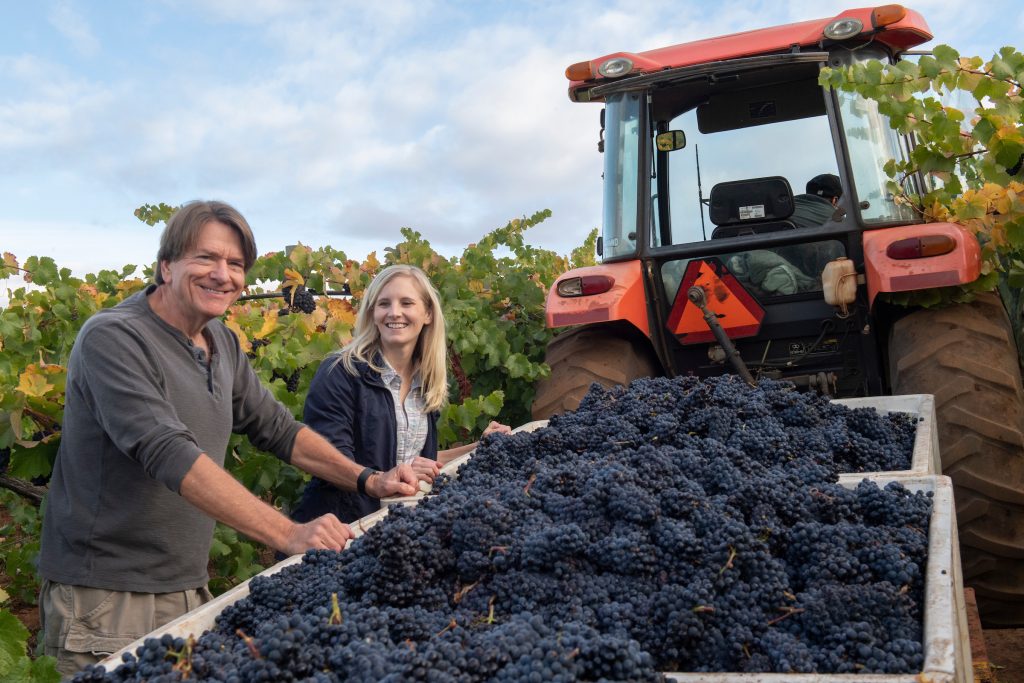By: Karen A. Jamrog
Willamette Valley Vineyards’ Jim Bernau aims to do more than just make world-class wine.
Jim Bernau’s enthusiasm is infectious. As the founder and CEO of Willamette Valley Vineyards in Oregon, Bernau’s passion for wine might not be surprising, but he also cares deeply about land stewardship, community building, promoting values that benefit everyone, and helping the world recognize Oregon as a bright star in the U.S. for winemaking and more.
Bernau, an Oregon native, became interested in wine as a boy, when his attorney father was hired by California winemaker Richard Sommer, who is believed to be the first to make Pinot Noir in Oregon. Bernau was allowed small tastes of wine at dinner and remembers the night when his dad held up a bottle of Sommer’s wine and declared, “Someday, grapevines will cover Oregon.” At the time, few would have believed in such a prophecy, but young Jim’s curiosity was piqued. At the age of 10, Bernau, along with his older brother, attempted to make wine using Concord grape juice stored in the family’s freezer. As the years went by, he continued to learn about viticulture and was active in the industry even after earning a law degree.
In 1983, 18 years after the frozen grape juice experiment, Bernau established Willamette Valley Vineyards with the goal of making world-class Pinot Noir. Starting out, he watered grapevines by hand because he couldn’t afford irrigation equipment.
“People genuinely thought we’d lost our minds,” Bernau says. “We really weren’t taken very seriously.”
But he stayed true to his conviction that he could showcase Oregon’s potential as a winemaking region and make some of the world’s best Pinot Noir while being a responsible steward of the land.
Now 68, Bernau has achieved his goal and then some: Willamette Valley Vineyards, today the largest winery in Oregon, was named “One of America’s Great Pinot Noir Producers” by Wine Enthusiast, and Bernau’s home state is recognized as one of the greatest wine regions in the world, especially for Pinot Noir.
Willamette Valley’s volcanic, mineral-rich soil and cool climate, backed by a collaborative atmosphere among the state’s winemakers, contribute to what Bernau says is the essence of Oregon and enable Willamette Valley Vineyards to craft elegant, classic wines with depth, rich mouthfeel, and balance. Though best known for its Pinot Noir, Willamette Valley Vineyards’ portfolio also includes Riesling, Pinot Gris, and Chardonnay.
The local weather doesn’t always make it easy. “It’s a struggle, a challenge,” Bernau says, similar to what any farmer or worker of the land must contend with. But like race-car driving, he says, “the greatest achievement can occur right at the edge of disaster”; in winemaking, grapes that are slow to ripen can produce superb wine. But the wines of Willamette Valley Vineyards also benefit from the Oregonian wine industry’s cooperative approach, Bernau says, rather than “a dog-eat-dog” mentality. “We learn from each other, and we help each other,” he says.
Believing that “in the end, it’s not what you do . . . but how you do it that is really important in life,” Bernau’s winemaking philosophy includes staunch support of environmentally friendly methods. At Willamette Valley Vineyards, those methods run the gamut from high tech to low, and include using UV-C light technology, developed by NASA, to combat powdery mildew in the vineyards; creating a simple slope-side apron to collect water during Willamette Valley’s heavy winter rains for drip irrigation in the vineyard; and using certified natural, sustainable cork rather than coal power-produced aluminum screw caps.
“We’re just scratching the surface of what we can do, and it’s not just with wine,” Bernau says. “Our winery is a vehicle for telling the story of how we live as Oregonians and what we value.” At Willamette Valley Vineyards, he says, “we’re modeling behavior that we think is conducive to living a wonderful life, to creating a wonderful future for those that will follow us . . . and is positive for humanity.”
